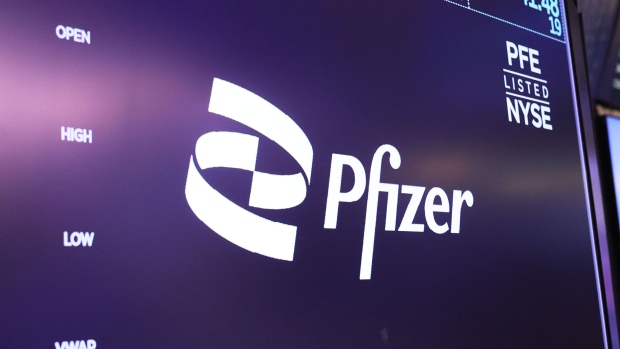Oct 31, 2023
Pfizer Quarterly Sales Fall Short As Covid Continues to Haunt
, Bloomberg News

(Bloomberg) -- Pfizer Inc.’s sales missed expectations for the quarter as its Covid-19 shot and pill continued to create instability for the drugmaker’s efforts to transition out of the pandemic.
A little more than two weeks after Pfizer shocked the market by cutting $9 billion from its full-year sales guidance as a result of plummeting demand for its Covid products, sales of its vaccine and pill once again disappointed. Investors have been looking for a floor in the company’s plummeting Covid business after those products at one point nearly doubled its revenue.
Overall third-quarter sales fell 42% to $13.2 billion, Pfizer said Tuesday in a statement, short of the Wall Street view of $13.5 billion. The company posted a loss of 17 cents a share on an adjusted basis, compared with the average estimate for a loss of 33 cents. The quarterly loss was Pfizer’s first on an adjusted basis more than three decades, according to data compiled by Bloomberg.
Sales of its Covid booster fell 70% to $1.31 billion, around $200 million short of analysts’ expectations, and Paxlovid sales tumbled 97% to $202 million, missing the mark by nearly $170 million. Questions remain about the prospects for Paxlovid, as well as whether the drugmaker’s expectation for a 17% vaccination rate with the latest Covid boosters is too optimistic.
Path to Growth
While the fading Covid sales were “not a huge surprise,” said Evan Seigerman, an analyst at BMO Capital Markets, questions remain about “the path to sustainable growth with the Covid reset behind us.”
Earlier this month, Pfizer agreed to take millions of Paxlovid courses back from the US government, which should allow for more private, higher-priced sales of the drug. Pfizer also said it’s cutting about $3.5 billion in costs across the company, including layoffs and reductions in research and development expenses. The company said on Friday that it would close two facilities in North Carolina as part of those measures.
The shares were little changed 3:15 p.m. in New York. They had plunged 40% so far this year through Monday’s close.
The company also awaits US regulatory approval for its $43 billion acquisition of cancer biotech firm Seagen Inc. The deal got unconditional support from European Union regulators, suggesting it may not face much US scrutiny.
Pfizer is still in the market for acquiring more companies, Chief Executive Officer Albert Bourla told David Westin on Bloomberg TV’s Wall Street Week segment. However, next year won’t likely see major deal activity as the company works to absorb Seagen, he said.
“We want to first consolidate that,” Bourla said, “start deleveraging a little bit.”
Read More: Pfizer Cuts Guidance as Demand for Paxlovid Pills Dries Up
As for Pfizer’s other drugs, blood-thinner Eliquis narrowly missed estimates with sales of $1.5 billion in revenue. Ibrance, a breast cancer treatment, met expectations of $1.24 billion in sales. A group of shots to protect against pneumonia beat estimates with sales of $1.85 billion. Pfizer’s sales of its new RSV vaccine were $375 million in the quarter, its first full three months on the market.
Analysts are closely following the development of Pfizer’s experimental obesity pill danuglipron that’s expected to yield mid-stage clinical trial data this year. The company expects to have data on “the best formulation option” early next year, Pfizer’s chief scientific officer Mikael Dolsten said on the earnings call.
Pfizer also moved another new small molecule to treat type 2 diabetes into an early-stage trial. Pfizer is building a new platform around the GLP area and obesity “with multiple different mechanisms and compounds,” Dolsten said.
“We have a pretty strong effort here,” he said on the call.
Flu Shot Delay
The drugmaker also said it will delay the launch of its mRNA flu vaccine to at least 2025 after adults under 65 years old who received it showed less powerful immune responses to influenza B than to influenza A, the two key strains of the virus. Moderna Inc. had a similar problem, and like its rival, Pfizer is reformulating the shot.
“The road ahead remains challenging” for Pfizer, Citi’s Andrew Baum wrote in a note. In addition to the Covid franchise downturn, the expensive Seagen purchase has potential for “talent-loss post integration,” he said.
(Updates with CEO comments in ninth paragraph.)
©2023 Bloomberg L.P.


